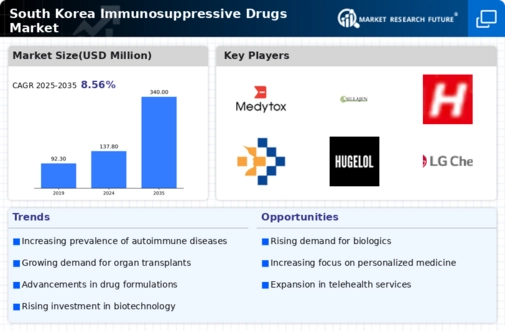Rising Geriatric Population
The demographic shift towards an aging population in South Korea is poised to impact the immunosuppressive drugs market significantly. As the elderly population grows, the prevalence of chronic diseases, including those requiring immunosuppressive therapy, is expected to rise. Currently, individuals aged 65 and older represent about 15% of the total population, a figure projected to increase in the coming years. This demographic trend suggests a growing need for effective immunosuppressive treatments to manage age-related health issues. Consequently, pharmaceutical companies are likely to focus on developing tailored therapies for this population segment, thereby driving growth in the immunosuppressive drugs market.
Regulatory Support for Drug Approvals
Regulatory bodies in South Korea are increasingly supportive of the approval processes for new immunosuppressive drugs, which serves as a vital driver for the market. The Ministry of Food and Drug Safety (MFDS) has streamlined its approval procedures, reducing the time required for new drug launches. This regulatory environment encourages pharmaceutical companies to invest in research and development, as they can bring innovative therapies to market more efficiently. The expedited approval processes are particularly beneficial for biologics and novel immunosuppressive agents, which are gaining traction in the market. As a result, the immunosuppressive drugs market is likely to experience accelerated growth, with a wider array of treatment options becoming available to patients.
Growing Prevalence of Autoimmune Diseases
The rising incidence of autoimmune diseases in South Korea is a critical driver for the immunosuppressive drugs market. Conditions such as rheumatoid arthritis, lupus, and multiple sclerosis are becoming increasingly common, necessitating effective treatment options. According to recent health statistics, autoimmune diseases affect approximately 5-7% of the population, leading to a heightened demand for immunosuppressive therapies. This trend is likely to continue, as awareness and diagnosis of these conditions improve. Consequently, pharmaceutical companies are focusing on developing innovative immunosuppressive drugs to cater to this growing patient population. The increasing prevalence of these diseases not only drives market growth but also encourages research and development efforts within the immunosuppressive drugs market.
Advancements in Drug Development Technologies
Technological advancements in drug development are significantly influencing the immunosuppressive drugs market. Innovations such as high-throughput screening, bioinformatics, and personalized medicine approaches are streamlining the drug discovery process. In South Korea, the integration of these technologies has led to the rapid development of new immunosuppressive agents, enhancing their efficacy and safety profiles. The market is witnessing a shift towards biologics and targeted therapies, which are often more effective than traditional small molecules. As a result, the immunosuppressive drugs market is expected to expand, with an increasing number of novel therapies entering the market. This trend not only improves patient outcomes but also stimulates competition among pharmaceutical companies, further driving innovation.
Increasing Investment in Healthcare Infrastructure
The South Korean government's commitment to enhancing healthcare infrastructure is a significant driver for the immunosuppressive drugs market. With substantial investments aimed at improving healthcare access and quality, the country is witnessing a transformation in its healthcare landscape. The government has allocated approximately $2 billion for healthcare initiatives, which includes funding for advanced treatment options and medications. This investment is likely to facilitate better access to immunosuppressive therapies for patients, thereby increasing demand within the market. Furthermore, improved healthcare facilities and services are expected to enhance patient education and adherence to treatment regimens, ultimately benefiting the immunosuppressive drugs market.
















